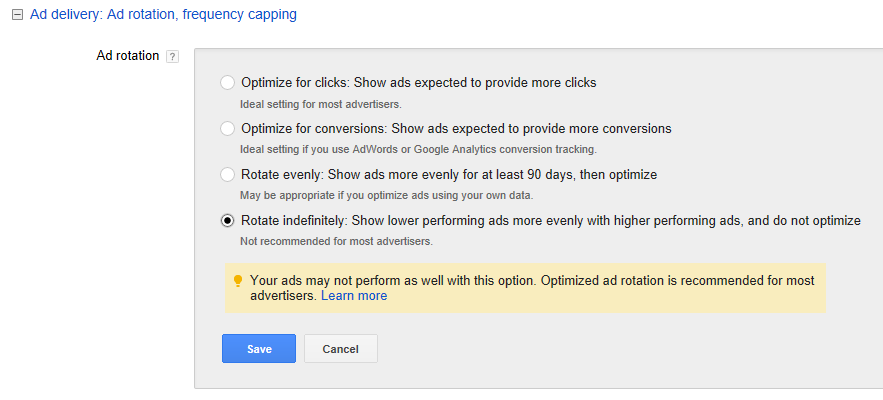There has been a flurry of activity from AdWords during the past couple of weeks. If you’re an advertiser, you’ve likely noticed the emails from AdWords, coming fast. In this post, I will explain the changes and how they could impact your advertising efforts.
AdWords Ad Rotation Settings
In the current structure of AdWords, ads are associated with a set of keywords in an organizational unit called, appropriately, an ad group. It’s best to have two to three ad variations running in each ad group to test which ad copy performs the best.
Ad rotation is the setting that informs AdWords how to decide between the various ads. There are currently four options for advertisers: “Optimize for clicks,” “Optimize for conversions,” “Rotate evenly,” and “Rotate indefinitely.”

There are currently four ad-rotation options for advertisers: “Optimize for clicks,” “Optimize for conversions,” “Rotate evenly,” and “Rotate indefinitely.”
“Optimize for clicks” gives AdWords the ability to favor the ad with the highest click-through rate. “Optimize for conversions” tells AdWords to use the ad that converts the most. “Rotate evenly” gives ads a more balanced, randomized view and then transitions to optimizing for clicks after 90 days.
However, as of September 25, 2017 there will only be two options, as explained by Google.
- “Optimize” will use Google’s machine learning technology to deliver ads that are expected to perform better than other ads in your ad group.
- “Rotate indefinitely” will deliver ads more evenly for an indefinite amount of time.
Campaigns that are currently using “rotate indefinitely” will stay that way and campaigns using the other three settings will shift to “optimize.”
As a pay-per-click practitioner, I recommend “rotate indefinitely” so that ad testing is more even, and thus fair. For PPC managers, it’s routine to check ad tests. But if you’re unable to dedicate much time to AdWords, then “optimize” could improve your results.
Terms and Conditions
Changes in terms and conditions often gets archived or ignored. However, in this case, for AdWords, there are several important changes.
- Google will have more leeway to call advertisers for notification purposes.
- Google will have more leeway to test campaigns without telling advertisers. From Google:
Testing. Customer authorizes Google and its affiliates to periodically conduct tests that may affect Customer’s Use of Programs, including Ad formatting, Targets, Destinations, quality, ranking, performance, pricing, and auction-time bid adjustments. To ensure the timeliness and validity of test results, Customer authorizes Google to conduct such tests without notice or compensation to Customer.
- For the U.S., Canada, and most of Latin America and Asia, disputes will be settled by binding arbitration. Advertisers cannot join class action suits. Advertisers can opt out of arbitration, however.
These changes may seem trivial. But they give Google significant legal protection. For example, if Google runs a test that harms your results, not only does Google not have to notify you (leaving the burden of discovery on you) but it won’t have to litigate the case and may have an easier time defending its actions to an arbitrator. I don’t like the overall direction.
Conversion Measurement
It worries me when AdWords tinkers with conversion measurement and reporting. The short version of this change is that Google is adding a new Google Analytics cookie. It will only work for sites with auto-tagging enabled in AdWords and with Google Analytics tags on their pages. It relates to changes that Apple is making in its Safari browser.
This sentence from Google concerns me:
AdWords will also use statistical modeling to estimate website conversions that could not be measured from Safari, and include them in your AdWords reporting.
I’m old school. If you can’t measure something, you shouldn’t guess and count it like it was measured. While I’m unsure how large the impact will be, for sophisticated advertisers this could have a measurable effect on their results. You can opt out by editing your Google Analytics code. But, nonetheless, keep an eye on this if you haven’t opted out. This is especially the case if you have a lot iPhone users, since they will most likely use Safari.
Remember, AdWords is a multibillion-dollar platform and Google’s main revenue driver. Google continually changes AdWords. It’s important that advertisers stay informed as to how the changes could impact them.
